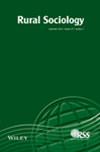土著社区的形成与社区的局限:智利南部的阶级分化与社会纽带☆。
IF 1.9
3区 社会学
Q2 SOCIOLOGY
引用次数: 0
摘要
本文试图通过研究一个特定的马普切社区,对农村土著社区的本质主义理解提出质疑。马普切人是智利最大的土著群体。自 20 世纪 90 年代以来,智利政府响应社会正义的呼声,购买土地并将马普切人迁移到他们可以拥有土地的地区,其中大部分是无地或几乎无地的小农原住民。本研究利用了 2020 年至 2021 年初从一个马普切社区收集到的定性数据。文章探讨了这些马普切原住民成为土地所有者的过程,以及这一转变在阶级分化方面对农村社区和家庭的意义。为此,文章对农村日常生活的关键方面进行了反思,如获得土地和机械。首先,文章通过分析新土著社区成员与智利政府为解决土著土地斗争问题而开辟的制度道路之间的关系,关注了新土著社区创建背后的故事。这反过来又说明了土著社区是如何形成的,同时强调了这些社区在参与这些公共计划时所引发的混乱。其次,文章反思了这个新土著社区的成员如何看待某些生产工具,特别是通过智利国家补贴获得的公用拖拉机。在这方面,文章展示了农业阶级的形成是如何与这些农村家庭对其共同拥有的拖拉机的看法联系在一起的。通过调查农村土著社区观念的转变,得出结论认为,农业阶级分化的动力导致了社区的发展,并勾勒出每个社区内农村个体家庭的轮廓。本文章由计算机程序翻译,如有差异,请以英文原文为准。
The Making of an Indigenous Community and the Limits of Community: Class Differentiation and Social Ties in Southern Chile☆
This article seeks to challenge essentialist comprehensions of rural Indigenous communities through examining one particular Mapuche community who were the recipients of a land subsidy. Mapuche people are the largest Indigenous group in Chile. Since the 1990s, the Chilean government, responding to calls for social justice, has purchased land and relocated Mapuche people, mostly landless or almost landless smallholder Indigenous peasants, to areas where they could own land. This study draws on qualitative data gathered from one Mapuche community throughout 2020 and early 2021. It examines the process by which these Mapuche Indigenous people became landowners, and the meanings of this transition for the rural community and households in terms of class differentiation. To this end, the article reflects on key aspects of rural everyday life, such as access to land and machinery. Firstly, it pays attention to the story behind the creation of a new Indigenous community, through analyzing the engagement of its members with the institutional path that was created by the Chilean State as a means of addressing Indigenous land struggles. This, in turn, shows how Indigenous communities can also be made while highlighting the disruptions triggered within such communities when engaging with these public schemes. Secondly, the article reflects on how the members of this new Indigenous community regard certain means of production, especially a communal tractor that was acquired through a Chilean State subsidy. In this respect, it shows how agrarian class formation is associated with these rural households' perceptions regarding their co-owned tractor. Through investigating shifting notions of rural Indigenous communities, it is concluded that dynamics of agrarian class differentiation led to community development, as well as demarking the contours of individual rural households within each community.
求助全文
通过发布文献求助,成功后即可免费获取论文全文。
去求助
来源期刊

RURAL SOCIOLOGY
SOCIOLOGY-
CiteScore
4.60
自引率
13.00%
发文量
47
期刊介绍:
A forum for cutting-edge research, Rural Sociology explores sociological and interdisciplinary approaches to emerging social issues and new approaches to recurring social issues affecting rural people and places. The journal is particularly interested in advancing sociological theory and welcomes the use of a wide range of social science methodologies. Manuscripts that use a sociological perspective to address the effects of local and global systems on rural people and places, rural community revitalization, rural demographic changes, rural poverty, natural resource allocations, the environment, food and agricultural systems, and related topics from all regions of the world are welcome. Rural Sociology also accepts papers that significantly advance the measurement of key sociological concepts or provide well-documented critical analysis of one or more theories as these measures and analyses are related to rural sociology.
 求助内容:
求助内容: 应助结果提醒方式:
应助结果提醒方式:


